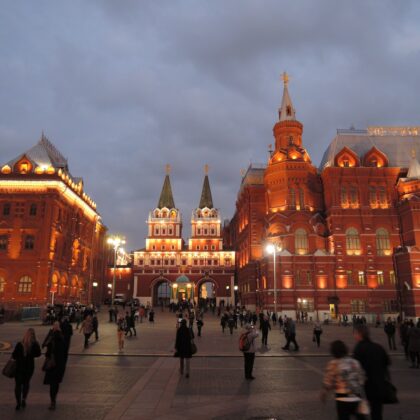Russia, disinvestment, business and human rights
The Russian Federation’s invasion of Ukraine on 24 February 2022 has resulted in serious violations of international human rights and humanitarian law. The invasion has been condemned by most of the international community. Several international organizations and states have thereafter imposed economic and financial sanctions against Russian individuals and businesses. The aggression has shaken the international markets. Prices of commodities have substantially increased, some transport routes have been cancelled, and several currencies have been under stress. Russian financial institutions have been excluded from Swift, the primary international system for financial transactions. Perhaps surprising to some observers, the private sector has also raced to condemn the aggression.
Several global corporations from different industries have since 24 February 2022 announced disengagement and disinvestment from the Russian federation. Majority of those are based in the Western constitutional democracies. Moreover, leading global stock exchanges such as The New York Stock and the London Stock exchanges have excluded or announced that they will exclude Russian-based or owned corporations from listing. Businesses are as, it appears, prepared to forego their investments at the Russian markers often at huge potential loss. Perhaps most notable have been the exit of some of the largest corporations in the extractive industry sector such Shell and BP. Even though some companies such as Total have yet to decide to exit the Russian market. Such exits that we have experienced are unprecedented in the recent global industry. However, what are the main reasons for such a systematic drive at least for disengagement and disinvestment from the Russian federation? Violations of international human rights and international human rights? How effective will such disengagement and/or disinvestment be?
The Russian market has always been challenging for businesses to invest in. It has its own specific rules stemming from the remnants of the planned economy and undemocratic regime. The Russian economy has been in the past two decades very much under the influence of the executive branch of government. The rule of law and state institutions have been weak and deficient and often described as captured by politicians. In her book, ‘Putin’s People’, Catherine Belton showed how Putin’s circle took in the last decades over the control over the largest Russian corporations. Foreign investments have been much more risky than in more stable economies.
Generally, the area of business and human rights has been underdeveloped in Russia. State authorities have not developed any full-fledged policy on business and human rights. Adherence to the UN Guiding Principles on Business and Human Rights has been in business exception an exception, not a norm. As such, human rights and environmental due diligence has not been taken up by the majority of businesses. Most of the positive impact has come from foreign investors. Such observation will not come as a surprise as serious human rights violations have been identified and reported in the report by regional human rights institutions and international organizations. Several high profile cases against former heads of largest Russian based corporations have ended at the regional human rights courts finding violations (see for instance, European Court of Human Rights, Khodorkovskiy and Lebedev v. Russia (No. 2), 51111/07 and 42757/07, 14 January 2020).
What has driven such large scale disinvestment and disengagement from the Russian market? Drivers include governance and regulatory, reputational, business and human rights risks and risks connected to the weak rule of law. First, the comprehensive and wide-reaching economic and financial sanctions have increased the governance and regulatory risks in their home jurisdictions of companies operating in Russia. Second, businesses have been concerned about reputational risks that their continuing presence in Russia would negatively affect their performance on their home markets where the majority of populations have been strongly against the invasion. Third, although the identification of and response to potential human rights risks of doing business in Russia has not been a priority in the past, they have gained a greater focus in recent years and particularly since 24 February 2022. Businesses have been increasingly concerned not about the safety of their employees, but also of human rights protection in their supply chains in Russia. Business and human rights standards have perhaps entered into the Russian market through the back doors by disinvestment. Fourth, the regulatory environment in Russia has been since 24 February 2022 even more unstable as usual. Investors’ legitimate expectations about stability of the Russian domestic system are not there anymore. For instance, one of the responses of Russian authorities to sanctions and business exits has been to freeze foreign investment under the threat of nationalisation. As a result, tens of the largest Western foreign investors in such an unstable environment have decided to at least temporarily exit the Russian market.
What will be the impact of disinvestment of Western companies from the Russian market? As it stands, the sanctions and disinvestment from the Russian market will generate substantial impacts on the Russian market. The Russian extractive industries will attempt to substitute the gap left by Western corporations by turning to China, India and beyond. If that will suffice to substitute the Western standard and maintain the current socio-economic livelihoods, remains to be seen. Perhaps more importantly, how long will current disengagement and/or disinvestment last? Past experience shows that economies find new ways in even conflict and post-conflict landscapes.
The business and human rights situation in Russia has been ripe for reform for decades. It is hoped that the current situation will propel positive changes in the Russian market after the war ends,that the investors which have exited from operations will not ignore business and human rights standards once the tensions decrease and they decide to return. The current disengagement and disinvestment from Russia is an opportunity to internalise business and human rights standards in companies, where they have not been a priority in the past. Nonetheless, past experience illustrates that one cannot be too careful with positive predictions as to the likelihood of long-ranging reforms in the Russian Federation. If the Russian market turns even more clearly to Asia, it will be perhaps even more challenging to advance business and human rights standards. As a result, it remains to be seen whether current disinvestment and disengagements will engineer permanent positive changes for business and human rights in the future in the Russian market and beyond or it is only a provisional arrangement. All in all, much will depend on the reform of general human rights and rule of law protections in the Russian Federation.
Jernej Letnar Černič is Professor of Human Rights and Constitutional Law at the Faculty of Government and European Studies of the New University (Ljubljana/Kranj, Slovenia). The author acknowledges that this post has been written within the auspices of the research project on ‘Holistic Approach to Business and Human Rights: A Normative Reform of Slovenian and International Legal Order’, no JP-1790, Slovenian Research Agency.





